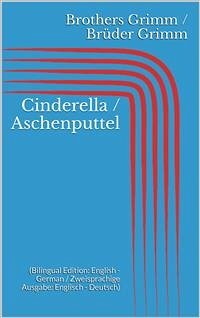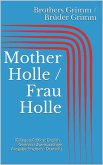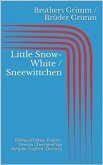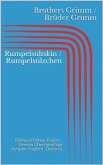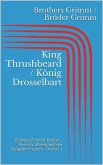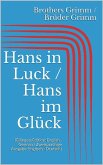This edition contains the English translation and the original text in German. "Cinderella", or "The Little Glass Slipper" (French: "Cendrillon, ou La petite Pantoufle de Verre", Italian: "Cenerentola", German: "Aschenputtel"), is a European folk tale embodying a myth-element of unjust oppression in "Histoires ou contes du temps passé" published by Charles Perrault in 1697, and by the Brothers Grimm in their folk tale collection "Grimms' Fairy Tales". Although both the story's title and the character's name change in different languages, in English-language folklore "Cinderella" is the archetypal name. The word "Cinderella" has, by analogy, come to mean one whose attributes were unrecognized, or one who unexpectedly achieves recognition or success after a period of obscurity and neglect. The still-popular story of "Cinderella" continues to influence popular culture internationally, lending plot elements, allusions, and tropes to a wide variety of media. The Aarne-Thompson system classifies Cinderella as "the persecuted heroine". The story of Rhodopis about a Greek slave girl who marries the king of Egypt is considered the earliest known variant of the "Cinderella" story and many variants are known throughout the world. "Aschenputtel" (bei Bechstein "Aschenbrödel") ist eine im europäischen Kulturraum weit verbreitete Märchenfigur, die im deutschsprachigen Raum vor allem durch die Märchensammlung der Brüder Grimm in Erinnerung geblieben ist. Das Märchen gehört zu Märchentyp 510a nach Aarne und Thompson. Es steht in den Kinder und Hausmärchen der Brüder Grimm an Stelle 21 (KHM 21) und geht durch mündliche Weitergabe auf Charles Perraults "Cendrillon ou la Petite Pantoufle de verre" ("Aschenputtel oder der kleine Glasschuh") von 1697 zurück. Ludwig Bechstein übernahm es in sein Deutsches Märchenbuch als "Aschenbrödel" (1845 Nr. 70, 1853 Nr. 62). Perraults Fassung mit den in Apfelschimmel verwandelten Mäusen und dem Kürbis, der mit Hilfe der Fee zur Kutsche wird, prägte maßgeblich Walt Disneys Zeichentrickfilm "Cinderella" von 1950.
Dieser Download kann aus rechtlichen Gründen nur mit Rechnungsadresse in A, B, BG, CY, CZ, D, DK, EW, E, FIN, F, GR, HR, H, IRL, I, LT, L, LR, M, NL, PL, P, R, S, SLO, SK ausgeliefert werden.

